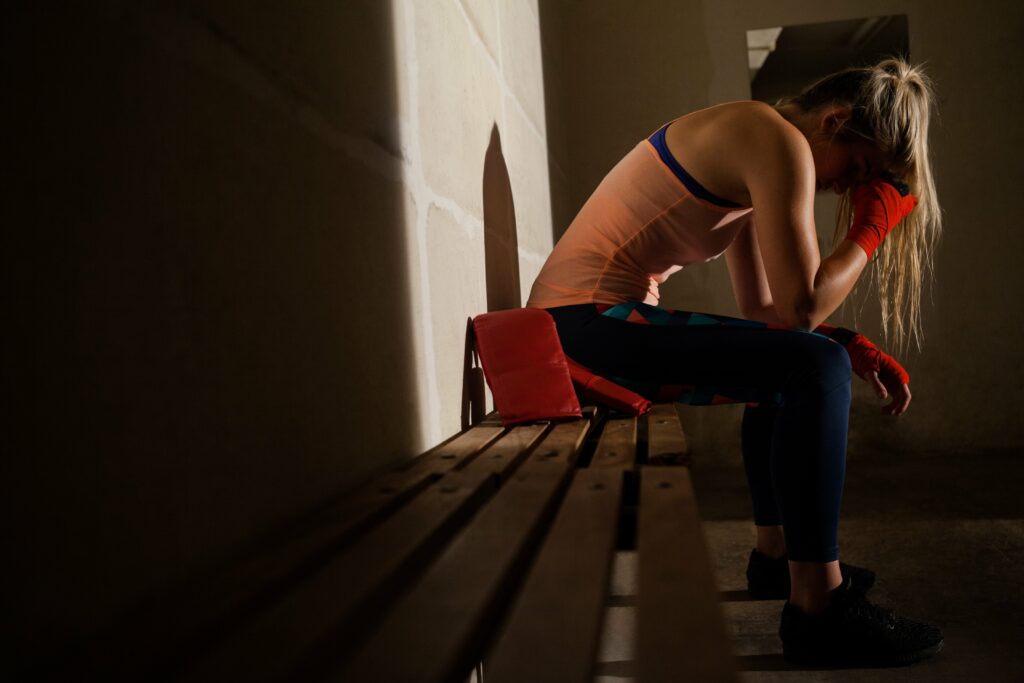Biomarkers for concussion diagnosis
Concussion diagnosis largely relies on subjective experiences. But new research is being conducted to measure physiological effects of concussion through biomarkers in athletes’ saliva. This approach could change the way concussions are diagnosed and help monitor athletes’ brain health post-concussion.
Intimidation at the gym
Going to the gym is beneficial for health, but what if you suffer from intimidation at the gym? Individuals may find the gym overcrowded and equipment confusing to use. You can help ease “gymtimidation” by starting with simple workouts, doing research about equipment and exercises, hiring a personal trainer, or going with a friend.
Active moms
Being a new mom is often stressful. Encouragingly, research shows that new and expecting moms who stay active are less likely to experience anxiety. Meeting the recommended physical activity guidelines of 150 minutes of moderate exercise per week is a great way for moms to protect and promote their mental health.
Coping through sport
Research shows that sport participation can help athletes cope with adverse life events. For example, social support networks built through participation in recreational sport leagues can build confidence and offer a reprieve from negative emotions. Adult sport leagues can harness these findings to better market and reshape their leagues to attract new participants.
Mental health in high performance sport
The mental health of athletes and key leaders supporting them is essential for performing consistently at the highest levels and achieving success in sport. The Mental Health Strategy for High Performance Sport in Canada provides a new roadmap for improving mental health outcomes for all Canadian athletes, coaches, and staff.
Creating sport environments that support mental health for girls and women

This blog post provides a recap of the fourth webinar in the 4-part mini-series Engaging Girls and Women in Sport. SIRC and Canadian Women & Sport co-hosted the mini-series, which you can access or learn more about by visiting our SIRC Experts Webinar page. Every year, 1 in 5 people in Canada will personally experience a mental…
Normalizing mental health in high performance sport
When USA Gymnastics legend Simone Biles put her mental health ahead of the competition at the Tokyo Olympic Games, she elevated discussions around mental health to historic levels. For Canadian athletes and team officials, working to normalize the conversation around mental health also took centre stage. Read more about Team Canada’s approach to mental health…
Inclusive approaches to mental health
There are 3 things on mental performance consultant Dr. Chantale Lussier’s radar when she thinks about inclusive approaches to mental health: the cultural (individualistic vs. collectivistic), the relational (intrapersonal vs. interpersonal), and the philosophical (secular vs. spiritual). “Mental health is the stuff that happens between us, not just the stuff that happens in us,” says…
Healthy fathers
Father’s Day is this Sunday! Although entering parenthood can be an exciting time, it comes with new challenges and responsibilities. This can often limit the amount of physical activity that fathers partake in. Research shows that fathers who maintain optimal physical activity levels have better physical and mental health, enhanced positive father-child bonding, and are…
Teen mental health
To improve mental health, teens (13 to 15 years old) need more exercise and less screen time. New research shows that adolescents’ mental wellbeing declines with more than 1 hour of recreational screen time a day. On the other hand, daily exercise has been consistently shown to help improve teens’ mental health and life satisfaction.